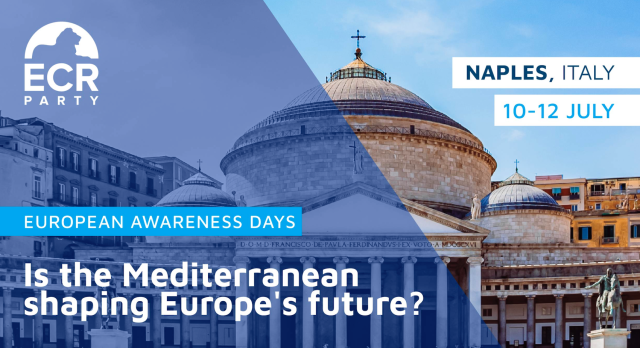
At the ECR Party conference in Naples (Is the Mediterranean shaping the Europe’s future?), Italian and European leaders call for realistic, sovereign-based policies to tackle illegal immigration and reshape the EU’s southern frontier
Naples, July 11 — Against the vibrant backdrop of Naples—a city long defined by the ebb and flow of cultures and peoples—conservatives from across Europe gathered to confront one of the continent’s most urgent and divisive challenges: illegal immigration. The opening panel of the European Conservatives and Reformists (ECR) Party conference, titled “Managing migration flows: a conservative perspective,” served as both a reflection on current policies and a rallying cry for a unified, pragmatic European strategy.
Michele Schiano, Italian MP and host of the event, opened the panel by grounding the debate in the very identity of Naples. “This city,” he said, “is a symbol of the Mediterranean—both its problems and its potential.” For Schiano, the Mediterranean is not simply a space of instability but a geopolitical and cultural engine that could redefine Europe’s future. “Naples,” he added, “can be a bridge—not only between North and South Italy, but between peoples in conflict.” The question, he said, is no longer whether the Mediterranean is shaping Europe—it is how Europe will choose to be shaped by it. And the answer, from his perspective, must involve clear political choices, strategic alliances, and above all, responsibility.
From that starting point, journalist Marilù Lucrezio, moderator of the panel, highlighted the recent shift in European discourse on migration—largely, she argued, thanks to Italy. She credited Prime Minister Giorgia Meloni’s government for “breaking the institutional paralysis” around border control, pushing forward with innovative solutions such as offshore processing centers in Albania, and compelling Europe to re-engage with the concept of fair burden-sharing. She emphasized that the debate is no longer about whether to act, but how—and Italy has been showing the way. Building on this theme, Minister for Parliamentary Relations Luca Ciriani outlined what he called the “Meloni doctrine” on immigration. “We are not against immigration—we are against illegal, uncontrolled, and dangerous immigration,” he said. The government’s strategy, he explained, is not to demonize migrants, but to distinguish between those who seek genuine integration and those who exploit European systems or traffic in crime. “The left,” Ciriani said, “believed immigration was always a resource. We say: only when governed properly.”
But perhaps the most strategic and far-reaching contribution came from Giovanni Donzelli, Vice President of the Parliamentary Committee for the Security of the Republic (Copasir). Linking migration with geopolitics and global resource competition, Donzelli argued that Europe’s future hinges not only on securing its borders, but on engaging seriously with Africa. “Africa is where population growth is exploding,” he warned. “If we do not invest in Africa—if we leave it to China and Russia—we are not only surrendering economic opportunity, we are risking uncontrollable migratory pressure.” For Donzelli, this is not a humanitarian matter alone—it is one of national survival. He warned of organized crime’s grip on migration routes and even cited examples of terrorism infiltrating via illegal crossings. “The boats don’t just carry migrants,” he said. “They carry jihadists, traffickers, and instability.” The solution, he argued, lies in realism: fighting smuggling networks, dismantling the “business of hospitality,” and treating the African continent not as a charity case, but as a central player in Europe’s own strategic map.
Echoing this perspective, Wanda Ferro, Undersecretary at the Italian Ministry of the Interior, stressed the effectiveness of the Italian approach. From bilateral agreements with countries of origin to the Mattei Plan aimed at improving living standards in Africa, Ferro portrayed the Meloni government as a model of actionable governance. “The rules of our nations and our cultures must be respected,” she said, adding a personal reflection: “As someone from the South who had to leave for work and study, I understand what it means to seek a better future—but it must be done legally, and with respect for the host country.”
The international dimension of the conversation was further explored by George Simion, Romanian MP and Vice President of the ECR Party. Simion denounced the criminalization of conservative politicians like Matteo Salvini for simply enforcing border control. “We need to stop the ideological hypocrisy,” he said. “Europe must choose between sovereignty and chaos.” He also called for demographic revitalization within Europe and praised the enduring ties between Italy and Romania, rooted in shared Latin heritage.
Gennaro Sangiuliano, journalist and former Italian Minister of Culture, drew from his experience as a correspondent in France to illustrate the long-term risks of failed integration. He warned of the consequences of unchecked cultural concessions, especially in contexts where Islamic extremism undermines basic freedoms such as women’s rights. “France is now reversing course,” he noted, “and considering laws to prevent non-regular marriages—because integration must be legal and mutual.” Lucrezio returned briefly to the human side of the crisis, drawing attention to one of its darkest aspects: missing migrant children, often victims of organ trafficking. “This is not just about immigration—it’s about protecting the most vulnerable,” she said.
In the closing remarks, Donzelli and Ciriani converged once more on a fundamental message: Europe must not only protect its borders, but rethink its place in the global balance of power. That means investment in Africa, strong leadership, and a return to national dignity. “If we don’t lead in Africa, we lose the global game,” Donzelli warned.
As the panel concluded, one point stood clear: the conservative approach is no longer merely oppositional—it is increasingly constructive, detailed, and solution-oriented. In Naples, what emerged was not a fear-based reaction to migration, but a vision. One grounded in sovereignty, anchored in responsibility, and committed to preserving Europe’s cultural and political integrity while addressing the root causes of migration. In an era of rising instability, the conservative blueprint—based on pragmatism, order, and mutual respect—offered not just critique, but direction.



 Subscribe
Subscribe